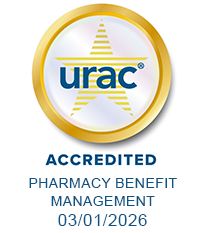MedImpact’s Personalized Medicine Program


The Challenge.
In the U.S., there are roughly 1.3 million emergency department visits and 350,000 hospitalizations each year because a prescribed medication caused injury to a member caused an unwanted, undesirable effect.I Approximately six percent of members experience an adverse drug reaction, or ADR, in a given year.ii
While “trial and error” prescribing, where a doctor may prescribe multiple medications over time to determine which one works best, is commonly required for conditions, such as depression -- at MedImpact, we worked to find another solution that is less time consuming, more cost efficient, and, above all, safer for members.
New Thinking, New Approach.
Pharmacogenomics, or PGx, is the study of how a person’s genetics affects their response to a drug. A person’s genetic makeup may impact how effective a medication will be or whether changes to dosing or different medications are required. It may also impact the risk of adverse reactions, such as stroke, arrythmia, and respiratory depression, among others.
Although medical science has long acknowledged the links between genes and drugs, the healthcare industry has struggled with timely delivery of the right test for the right members with actionable results to the right prescribers.
This program is intended to help overcome these challenges to deliver a personalized medicine solution with the potential to make PGx a seamless part of every health plan prescription benefits program. Our PGx Difference MedImpact’s vision and approach are radically different than other PGx solutions. Today, most PGx programs test to determine how an individual will respond to a single therapy prescribed by a single provider. MedImpact screens for genetic interactions with more than 200 commonly prescribed medications. And we use MedImpact’s claims records to notify every current provider who has prescribed medications within the prior 120 days for that patient of all potential genetic-drug interactions.
The Trial.
MedImpact ran a year-long pilot of our PGx solution for a health plan that serves Wisconsin public employers, their staff, and families throughout the state. Of their members, we enrolled 144 that would benefit the most from testing. The members took a gene test using a simple, at-home mouth swab. With the results, we began monitoring all their MedImpact pharmacy claims for potential ADRs based on their genetic profile. And with this one test, we are able to continue monitoring for potential issues while the member’s pharmacy benefit is being administered by MedImpact. In the pilot, there were 352 prescribers who ordered a drug with potential genetic implications for their members. MedImpact provided guidance on 83 medications and prescribers made adjustments or noted monitoring measures to 65% of these medications. This led to:
• Greater Member Safety. Of the 144 participants, the test identified 38 medications that could have resulted in ADRs. To protect their patient’s safety, prescribers changed prescription drugs 47% of the time, thereby reducing the potential for serious adverse reactions. Based on average hospitalization and emergency room costs, avoiding just these few events could have saved the plan $55,000.
• Better Efficacy and Less Waste. Effectiveness of medications was of concern for 45 treatments, and prescription dosing published clinical references were provided to prescribers 47% of the time. In all cases, prescribers modified the medications or doses – which also helped to reduce drug waste.
• Ongoing Protection. We reached out to each member’s prescriber and provided medications from a list of 200 possible medications impacted by genetics for that member -- even if the medication was not currently prescribed. As a result, prescriptions that align with the member’s genetics improved by 12%. And throughout the member’s enrollment in a pharmacy benefit plan administered by MedImpact, when he or she attempts to have a prescription filled for any prescription drug that does not align with his or her genetic makeup, the prescriber will be alerted.
These changes in prescribing reduced concerns for adverse events and ineffective therapies and improved the member experience. The Learnings: A Scalable Approach To “Any Drug, Any Time, Any Prescriber” PGx Many payers have concluded that single drug, single prescriber PGx solutions can be costly and, in many circumstances, provide a low return on investment (ROI). MedImpact’s approach not only provides members with a reference for potentially adverse events and ineffective therapies for years to come, it can offer a significant near and long-term ROI.
Citations:
i https://www.cdc.gov/medicationsafety/adult_adversedrugevents.html
ii Taché SV, Sönnichsen A, Ashcroft DM. Prevalence of adverse drug events in ambulatory care: a systematic review. Ann Pharmacother 2011;45:977-89.

Ready for a change?



